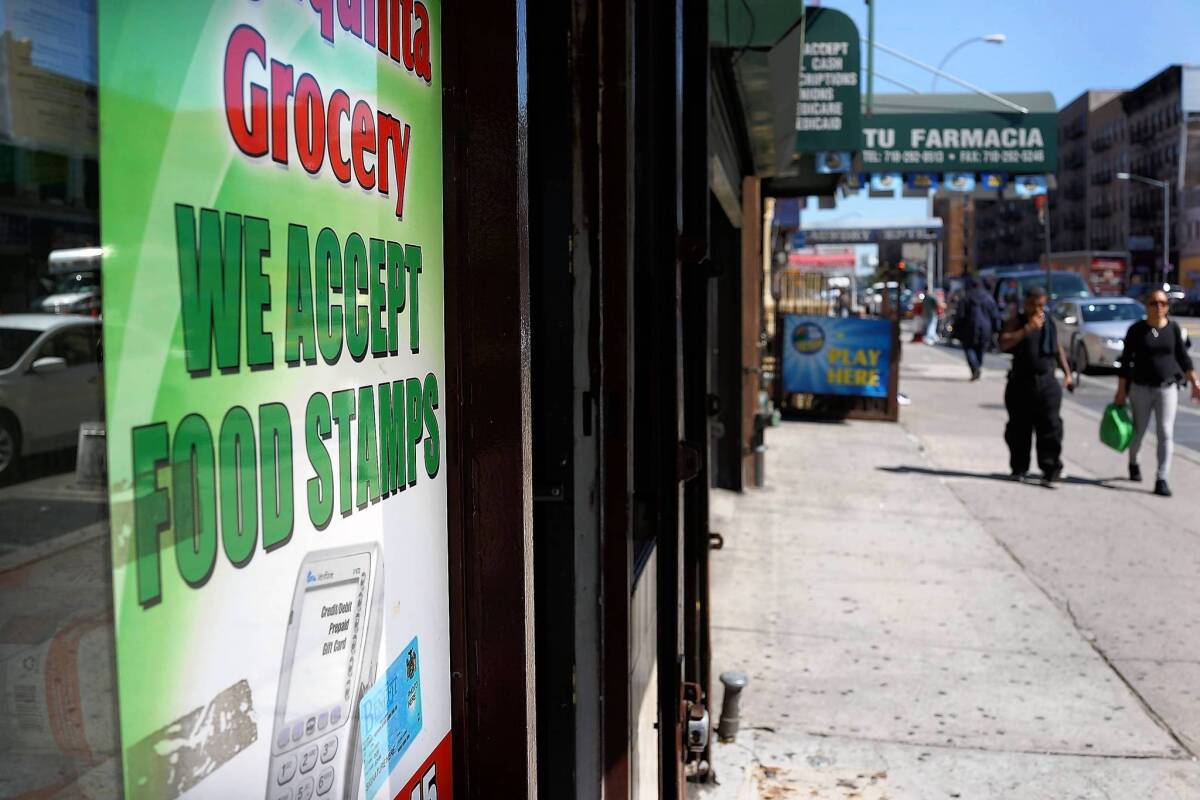688,000 people will lose food stamp benefits under Trump’s new work rule

- Share via
Hundreds of thousands of Americans who rely on the federal food stamp program will lose their benefits under a new Trump administration rule that will tighten work requirements for recipients.
The move, announced Wednesday, is the administration’s latest in its attempt to scale back the social safety net for low-income Americans. It is the first of three proposed rules targeting the Supplemental Nutrition Assistance Program, known as SNAP, to be finalized. The program feeds more than 36 million people.
The plan will limit states from exempting work-eligible adults from having to maintain steady employment in order to receive benefits.
The Agriculture Department estimates the change would save roughly $5.5 billion over five years and cut benefits for roughly 688,000 SNAP recipients. That’s down from its original estimate that 750,000 people would lose benefits.
Under current rules, work-eligible able-bodied adults without dependents and between the ages of 18 and 49 can receive only three months of SNAP benefits in a three-year period if they don’t meet the 20-hour weekly work requirement. But states with high unemployment rates or a demonstrable lack of sufficient jobs can waive those time limits.
The new rule imposes stricter criteria that states must meet to issue waivers. Under the plan, states can issue waivers only if a city or county has an unemployment rate of 6% or higher. The waivers, which can be issued only if the state’s governor supports the request, will be good for one year.
The final rule will be published in the federal register Thursday and go into effect in April.
Agriculture Secretary Sonny Perdue said the rule will help move people “from welfare to work.”
“We want to encourage people by giving them a helping hand, but not an infinitely giving hand,” he said.
Congressional Democrats and advocates for the poor were quick to condemn the administration’s actions.
Sen. Debbie Stabenow (D-Mich.) said the plan will serve only to punish workers whose jobs are seasonal or unreliable.
“This administration is out of touch with families who are struggling to make ends meet by working seasonal jobs or part-time jobs with unreliable hours,” said Stabenow, the top Democrat on the Senate Committee on Agriculture, Nutrition and Forestry.
House Republicans unsuccessfully pushed to include SNAP work requirement provisions in last year’s farm bill. Stabenow said that “there’s a reason” those provisions didn’t make it into the final version of that bill.
Robert Greenstein, president of the Center on Budget and Policy Priorities, said the rule would disproportionately affect minorities. He urged better job training and a higher minimum wage instead.
“Denying them basic food and nutrition is not the route that a fair and compassionate administration of either party should take,” he said in a statement.
Over the past year the Agriculture Department has proposed three significant changes to the food stamp program. In addition to restricting time-limit waivers, the department has proposed eliminating broad-based categorical eligibility, which is a measure that allows recipients of certain non-cash public benefits to automatically qualify for food stamps, and has proposed changing how utility costs are factored into benefit calculations.
Brandon Lipps, deputy undersecretary for the Agriculture Department’s Food Nutrition and Consumer Services, did not say when the department would finalize the other two proposed rules.
Taken together, the three measures would affect roughly 2.2 million households and 3.7 million individual beneficiaries, the Urban Institute estimated in a study released last month.
House Speaker Nancy Pelosi (D-San Francisco) blasted the Trump administration’s efforts to reduce public benefits.
“Instead of combating food insecurity for millions, connecting workers to good-paying jobs or addressing income inequality, the administration is inflicting their draconian rule on millions of Americans across the nation who face the highest barriers to employment and economic stability,” Pelosi said in a statement.
James D. Weill, president of the Food Research and Action Center, said the plan is “deeply flawed and ill-conceived” and would lead to higher rates of hunger and poverty.
“The final rule would cause serious harm to individuals, communities, and the nation while doing nothing to improve the health and employment of those impacted by the rule,” he said.
SNAP isn’t the only public benefits program that the Trump administration is trying to shrink. Last year the administration announced it would let states impose work requirements on Medicaid recipients. Housing and Urban Development Secretary Ben Carson also considered a proposal that would have tripled rents for the poorest Americans and allowed local governments to implement work requirements on those receiving housing assistance, but he ultimately backed off the plan.
Linderman writes for the Associated Press.
More to Read
Sign up for Essential California
The most important California stories and recommendations in your inbox every morning.
You may occasionally receive promotional content from the Los Angeles Times.










